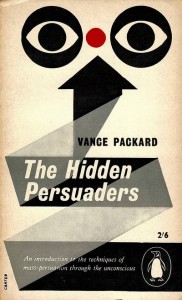Nudges and Subliminal Media: Two Examples of Attention and its Complexities
One of the themes in this week’s class is the question of how we pay attention to media messages. In class, we’re going to discuss some of the ways that this has been framed in communication theory traditionally and how this is being transformed in the present moment of digital media and networked technologies.
There are a number of different approaches that we can take to these questions. One of them involves thinking about how audience members have been thought about historically and in the present day. Expanding the material covered in the readings, I wanted to draw your attention to two cultural phenomena – one contemporary, the other historical – that have touched upon the complex relationship between attention and communication.
The first of these is the widely debunked theory of subliminal messaging; the idea that “hidden” message can have a equal or greater effect on audiences than the messages they focus on when interpreting stimuli. Here is a review of Swift Viewing (2012) by Charles Acland, a professor at Concordia University in Montreal, about the history of theories of “hidden” messages. He argues that our ideas about these messages are an everyday way of making sense of an increasingly complicated and rapid media and information environment.
There , there is the coverage of how behavioural psychology is being put to use in the United Kingdom as away of encouraging people to act in particular ways. While the article concentrates on the idea of behaviour, it is worth noting that it is often the communication of messages that serves as the cues for these changes in behaviour. They succeed because they structure the decision-making process, not because they decide for the person. In this way, they remind us of the complex ways in which messages are interpreted and acted upon.

Comments are closed, but trackbacks and pingbacks are open.